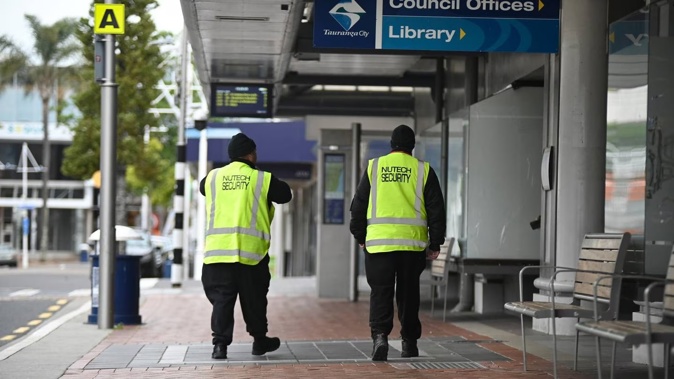
The Bay of Plenty Regional Council is looking to “roll back” from the ongoing cost of providing security at key Tauranga bus stops and has asked the city council to foot part of the significant bill.
The regional council has spent more than $1 million for the security services at Mount Maunganui, Greerton, and CBD bus stops. It has done so since January 2021 to help curb a spike of anti-social behaviour.
A Public Transport Committee meeting this week heard the regional council would now transition away from funding this security service which, in 2021, was initially estimated to cost $1m a year. The committee heard the most recent bill cost between $800,000 to $900,000 a year.
There had been a spate of violent incidents involving groups of young people targeting drivers and passengers.
Incidents included a young man carrying a homemade Taser, a teenage girl being robbed and hair almost set on fire, death threats and racial abuse.
In May 2022, bus drivers boycotted these bus stops for health and safety reasons.
At the meeting, councillor Lyall Thurston questioned fellow committee member and Tauranga City commissioner Stephen Selwood about the city council’s lack of financial support to fund the security.
/cloudfront-ap-southeast-2.images.arcpublishing.com/nzme/ZQQ2LKWUTLM352J2IEXIWLV3LE.jpg)
Bay of Plenty Regional Council Public Transport Committee member Lyall Thurston. Photo / Andrew Warner
“In terms of the provision of security services at Farm St and Durham St, we know there was some pushback from TCC with regards to cost sharing on this and I see it’s an item on the agenda for the upcoming meeting with you guys ... is this an item to be discussed again? Maybe the commissioner may be able to help in terms of cost-sharing the security services on Farm and Durham St? We are carrying the costs at the moment, I understand, as a gesture to you Mr Commissioner.”
Selwood, who had just arrivedat the meeting moments earlier, said he was unaware of the conversation.
Regional council director of transport Mike Seabourne told the committee the security update was an operational cost “we are looking to reduce”.
“Staff believe that by having [design elements] in place and slowly rolling back from it, we can potentially reduce the whole service altogether and reduce the total operation cost, that’s our first step.
“There’s a bit of testing and understanding before we completely roll back out of it. We are required to provide a secure service as a council. It’s part of our costs in terms of the regional council’s responsibilities but at the same time, we will be looking to reduce the costs to council.”
Thurston added: “With a cost-sharing proposal to TCC”.
Committee chairman Andrew von Dadelszen said the security issues that initially prompted the need for security had “greatly reduced”. He said it was possibly due to the relocation of the CBD bus interchange moving from Willow St to Durham St later in 2022.
/cloudfront-ap-southeast-2.images.arcpublishing.com/nzme/HHVSSKNAPRDITBZRYCVKVC6KBQ.jpg)
Tauranga bus drivers have faced a flurry of abuse at bus stops. Photo / George Novak
“I had it from a constituent of mine saying that it might have been because it’s close to the Works and Income offices that undesirables don’t want to mingle around there too often in case they lose their benefits,” von Dadelszen said.
After a pause in the meeting, von Dadelszen said: “It has gone dramatically down because of the shift, that’s all I’m saying.”
Councillor Jane Nees said it was imperative to “keep a close eye on things”.
“If we continue to have media reports on incidents, that will reinforce the feeling ... that is not necessarily that safe.”
The matter was expected to be discussed further in a Tauranga Public Transport Joint Committee meeting on April 5.
Bus stop security was not the only matter for discussion among committee members, who signed off on a bus network refresh, signalling the removal of buses from Totara St, plus a new flagship service linking Tauranga Crossing, Greerton, Cameron Rd, Tauranga CBD and Mount Maunganui.
The changes will now go out for community engagement.
During the discussion about the refresh, Nees referred to anticipated road works expected to take place as Tauranga City Council carries out Stage 2 of its Cameron Rd upgrade.
Nees addressed Selwood, saying she wanted the city council to look at priority measures to help buses get ahead of traffic congestion.
“I have to admit Commissioner Selwood, that I have a little bit of sympathy for mayor Brown in Auckland with what seems to be permanent road cones and safety measures which are shutting off whole lanes all over the city. I just wonder if they need to be so permanent and so extensive because there doesn’t seem to be a lot of people working around some of those road safety measures.”
Earlier this week Brown called for his own council organisation, Auckland Transport, to reduce its “unjustifiable” $145 million spend on road cones and traffic management in the hopes of filling a massive budget hole.
Selwood said he shared Nees’ frustration “along with most Tauranga City residents”.
He described the situation as a “trade-off” between meeting statutory health and safety requirements and the time it took to set up work sites.
“The trade-off is obviously the backlog on the traffic, the counter is that they don’t open up so many work sites but then it would take longer to do the job. So that’s the balance we are all frustrated by. I think the core issue is whether or not the requirement for health and safety has gone too far in my mind ... but we must comply.”
The committee proposed to instruct staff to report back on customer segmentation and initiatives to increase patronage.
However, councillor Ken Shirley said he was “staggered” the regional council, which has been running public transport since 2001, did not already have the information at hand.
“I would’ve thought that would be the starting point 20 years ago. I’m just staggered we don’t know. It’s costing a fortune and we don’t know what the customer base is.”
Despite Shirley’s concerns, he and the rest of the committee signed off on the resolution for staff to report back.
Take your Radio, Podcasts and Music with you









